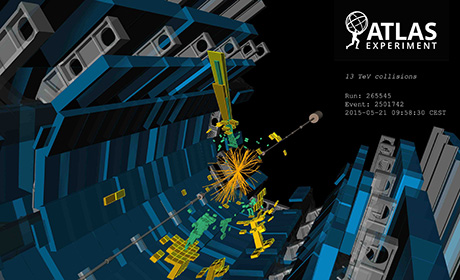Millions in Funding for Particle Physics in Heidelberg
8 July 2015

Particle physicists at Heidelberg University have been awarded funding for their research at the world’s largest and most powerful particle accelerator, the Large Hadron Collider (LHC) in Geneva. Over the next three years, the Federal Ministry of Education and Research (BMBF) will provide more than nine million euros for work on the ATLAS, ALICE, and LHCb experiments at the LHC. Related theory projects were also approved.
After a two-year break, the Large Hadron Collider at the CERN European Nuclear Research Centre has resumed operations and has been delivering new data since the beginning of June. “The past two years were marked by very difficult and hard upgrade work,” says Prof. Dr. Hans-Christian Schultz-Coulon of the Heidelberg Kirchhoff Institute for Physics. Now the LHC has been “relaunched” with increased energy, an improved accelerator and improved experiments. At a record energy of 13 teraelectronvolts (TeV), protons are once again colliding within the particle detectors. With the new data the CERN physicists hope to gain further surprising insights into the nature of the recently discovered Higgs particle and phenomena beyond. “With the funding from the BMBF, Heidelberg University can continue to participate in this research journey and carry on with its extremely successful work,“ says Prof. Dr. Ulrich Uwer of the Institute for Physics at Ruperto Carola. With their experimental and theoretical work, Heidelberg physicists are making important contributions to both data analysis and data interpretation as well as the operation and upgrade of the LHC experiments.
Over 10,000 researchers from more than 80 nations are participating in the CERN experiments, including numerous students and doctoral candidates. Their work aims at answering fundamental questions on the building blocks of matter and their role concerning the genesis of our universe. Scientists working on the ATLAS experiment, for example, are exploring the origin of the elementary particle masses and attempting to unravel the nature of dark matter. The ALICE collaboration is analysing the properties of the so-called quark-gluon plasma a new state of matter that is believed to have made up the universe shortly after the Big Bang. LHCb research focuses on understanding the differences between matter and antimatter, which is the basis for the existence of our world.
In Germany, the funding for the LHC experiments is structured in four BMBF research foci (FSPs). More than 20 universities and research institutions with numerous research groups are involved. Three of these FSPs will be led by Heidelberg physicists in the coming years. FSP spokespersons are Prof. Dr. Johanna Stachel for ALICE, Prof. Uwer for LHCb and as of mid-2016, Prof. Schultz-Coulon for ATLAS. The additional principal investigators are Prof. Dr. Stephanie Hansmann-Menzemer, Prof. Dr. Tilman Plehn and Prof. Dr. Andre Schöning.

